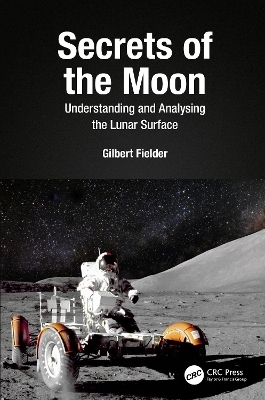
Secrets of the Moon
CRC Press (Verlag)
978-1-032-01985-7 (ISBN)
Secrets of the Moon: Understanding and Analysing the Lunar Surface provides a unique account of the origin of key features on the lunar surface. Containing historical accounts and the latest observations from the field, in addition to exciting data from the Apollo manned missions, it describes the development of our current understanding of our Moon. It also explores the fracturing of the Moon, a topic not explored in other literature in the area, and contains a statistical treatment of the smaller craters of the Moon, as well as a geological treatment of the larger craters. This moderately technical account is designed to clarify and update the general thinking on the nature and origin of the most important lunar surface features for both undergraduate and research students. It may also be read by the professional scientist, especially the astronomer and the geologist who has found little time to study the Moon’s topography, in addition to the lunar amateur astronomer and even the dedicated layman with a keen interest in lunar science. The book excludes nearly all mathematical symbols in order to remain accessible to those without a formal education in the area.
Key Features:
Authored by an expert in the area
Presents a comprehensive account of the lunar surface, from historical observations to the NASA Apollo manned missions and the latest observations and data in the field
Includes a statistical and geological treatment of the craters
Dr. Gilbert Fielder is Reader Emeritus at Lancaster University, UK. He performed extended teaching at Lancaster University on Planetary Science and introduced a new degree course on Remote Sensing. Prior to this, he was Principal Investigator in NASA’s Heat Capacity Mapping Programme, while continuing to head the Lunar and Planetary Unit at Lancaster until retirement. Dr. Fielder has authored several books, and presented many BBC and ITA television news programmes, as well as popular programmes with Sir Patrick Moore (on the BBC’s “The Sky at Night”) and, on the occasion of the first landing of astronauts on the Moon, with David Frost as Chairman in a special programme.
1. Preparatory Studies 2. Studies at Manchester and Pic-du-Midi 3. Wrinkle Ridges 4. The Straight Wall 5. Thoughts on Mare Imbrium 6. The Apparent Acceleration of the Moon 7. The Slowing Rotation of the Earth 8. The Receding Moon 9. Distorted Craters 10. The Lunar Grid System 11. Mapping the Grid around the Whole of the Moon 12. Faulting and the Rotation of the Moon 13. The Origin of the Lunar Grid System 14. Melting in the Moon 15. The Origin of the Moon 16. Fine Lineaments and their Significance 17. The Ages of the Lunar Surface Features 18. The Origins of Small Craters 19. The Proportion of Endocraters to Impact Craters 20. The Origin of Crater-chains in Grid Fractures 21. The Origins of Small Craters in a Lava Flow 22. Small Double Craters 23. Double Craters and the Depth of Compaction of the Regolith 24. Dating the Mare Flows 25. Studies of Large Craters 26. The Ray-Craters Tycho, Copernicus and Aristarchus 27. Unexpected Volcanic Flows 28. Volcanic Tumuli of the Floor of Tycho 29. The Unusual Rocks of Tycho, Copernicus and Aristarchus 30. Cracks in Tycho and Kilawea 31. Central Peaks and the Impact Process 32. The Crater Aristarchus 33. The Crater Copernicus 34. Dating the Lavas of Tycho and Aristarchus 35. The Origin of the Lavas in Impact Craters 36. Tensions in the Lunar Crust 37. Is there any current Volcanic Activity on the Moon? 38. Maria, Rilles and Wrinkle Ridges 39. Maria and Mascons 40. Ghost Craters and Elementary Rings 41. The Nature of the Lamont Complex 42. Terrestrial Ring Complexes and their Origin 43. Are there Ring Dykes on the Moon? 44. The Origins of Large Lunar Craters in General 45. Return to the Moon
| Erscheinungsdatum | 06.12.2021 |
|---|---|
| Zusatzinfo | 4 Tables, black and white; 34 Line drawings, black and white; 17 Halftones, color; 123 Halftones, black and white; 17 Illustrations, color; 157 Illustrations, black and white |
| Verlagsort | London |
| Sprache | englisch |
| Maße | 156 x 234 mm |
| Gewicht | 453 g |
| Themenwelt | Naturwissenschaften ► Biologie |
| Naturwissenschaften ► Physik / Astronomie ► Astronomie / Astrophysik | |
| Technik ► Luft- / Raumfahrttechnik | |
| Technik ► Umwelttechnik / Biotechnologie | |
| ISBN-10 | 1-032-01985-9 / 1032019859 |
| ISBN-13 | 978-1-032-01985-7 / 9781032019857 |
| Zustand | Neuware |
| Informationen gemäß Produktsicherheitsverordnung (GPSR) | |
| Haben Sie eine Frage zum Produkt? |
aus dem Bereich


